STUDENT SUCCESS

Student Workers
IN THIS ISSUE
GETTING TO KNOW MORE ABOUT SAS
CELEBRATING OUR STUDENT WORKERS
HIGHLIGHTS OF STUDENT SUCCESS CAMPUS-WIDE


GETTING TO KNOW MORE ABOUT SAS
CELEBRATING OUR STUDENT WORKERS
HIGHLIGHTS OF STUDENT SUCCESS CAMPUS-WIDE

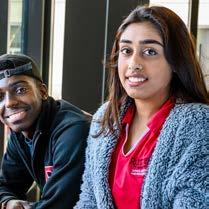
3
COVER STORY: STUDENT WORKERS
Student Workers at Rutgers–Camden gain invaluable academic and professional experience

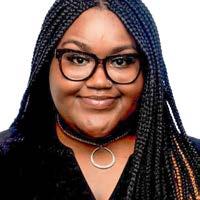
42
RAPTOR RECOGNITION
Interviews with our student success champions


17
DATA DEEP DIVE
Considerations for addressing CSI results


19
DIVISION HIGHLIGHTS
Ensuring student engagement: Promoting success throughout and beyond our beloved campus community
The Student Success Insider
e-magazine is produced by the Division of Student Academic Success
SPONSOR Dr. Marsha L. Lowery
EDITOR-IN-CHIEF Dr. Jason L. James Jr.
CONTRIBUTORS Lindsay Peck, Dr. Randi Mayers, Jonice Schley, Angela DeRocini, Heather Harris, Matthew West, Brandon Quiles, Jordan Meyers, Laura Collins, Christopher Gebhart, and Chanin Coyle
ART DIRECTOR Jamie Victor
48 STAY TUNED Upcoming events and initiatives


SAS employees are committed to student academic success, and the work of the members of the SAS Division aligns with our mission, vision, pillars, and values.
Together, these support the efforts towards fulfilling our strategic plan.
The SAS Strategic Plan can be found by clicking here.
The Division of Student Academic Success leads persistence efforts that result in improved educational equity, retention, and timely graduation from Rutgers University–Camden. Our team empowers students to develop identity consciousness, sense of belonging, self-efficacy, and academic responsibility to become the best versions of themselves in and out of the classroom. Through personalized and holistic supports, we provide students with the resources, tools, and opportunities to define success for themselves.
The Rutgers University–Camden Strategic Plan can be found by clicking here.
Student Academic Success will be a national leader in utilizing student-centered approaches to improve success outcomes. Our team fosters student academic success by using data to identify and nimbly address student needs to eliminate any gaps in graduation rates. Through our work, our students will build on their existing strengths and demonstrate their development in pursuit of their goals in college and beyond.
Contributing to a person’s understanding of their values, goals, attitudes, and beliefs.
SAS honors the multiple identities that our students bring to Rutgers–Camden. We contribute to students’ identity development by offering experiences that encourage them to build cultural capital, attain mastery of self, and grow their academic identity.
Fostering a level of respect, value, acceptance, care, inclusion, and mattering.
SAS empowers our students to participate fully in their collegiate pursuits. We contribute to students’ sense of belonging by providing opportunities for them to develop meaningful relationships with the Rutgers–Camden community.
Developing a person’s belief in their capacity to execute behaviors necessary to produce specific performance attainments.
SAS believes students can fulfill their full potential. We contribute to students’ self-efficacy by encouraging them to think critically, take risks, and advocate for themselves to build the skills necessary to positively contribute to their community.
PILLAR 1
Data-informed practice is at the core of all SAS efforts. To effectively advance the achievement of our students and the campus overall, we must regularly seek out empirical evidence and use it responsibly to meet our students’ needs. We accomplish this by contextualizing our decisions using data and theory.
PILLAR 4
SAS is committed to developing a sense of belonging amongst those we servce, with holistic services to onboard first year and transfer students to the University. We foster affinity-based communities to help students realize their intersectional identities.
Cross-campus collaboration and mastery of essential skills are key to fulfilling our mission. To nurture continued excellence and maximize campus community engagement, we must invest time into building trusting and reliable relationships with partners and resources into developing new talent. Efforts to do so include nomalizing transparency and dta sharing, collectively addressing student challenges, serving as subject matter experts and thought partners, and exposing staff and students to skill-building opportunities.
Instilling a person’s sense of duty to their academic progress; to become accountable for their own journey.
SAS welcomes students from a variety of academic backgrounds and knowledge levels. We contribute to students’ academic responsibility by helping them set and adjust goals, build positive habits, and participate in experiential learning.

PILLAR 3
SAS is dedicated to enhancing student experiences through process improvement, efficiency, and consistency. We aim to do so by identifying and addressing problematic procedures and holding ourselves accountable for eliminating known barriers.
PILLAR 5
As our campus becomes increasingly diverse, it is our responsibility to ensure that we meet the unique needs of all our students and that we honor their intersecting identities. Thus, expanding support offerings, exploring additional funding opportunities, and celebrating student success remain priorities for our future.
Are/were you a student worker? Do you know a student worker?
What comes to mind when you think of a college student who also works on campus or at a campus-related location? Student workers have special and unique college campus experiences, and they can be commended for their dedication to their academic work and to their campus community.
Student workers balance several responsibilities from taking on a rigorous course schedule and working other jobs – full- and part-time. In one research study of students participating in a student worker program who were also first-year undergraduate students enrolled at a four-year university, Lewis (2021) found that study participants were about “46% more likely to retain from their first year to the next at their institution. Additionally, the study found that for each hour the student participates in the program, they are .4% more likely to retain” (pp. iii-iv). While student workers are generally busy, they tend to tap into resources and use strategies to find success in their academic pursuits.
During the Fall 2024 semester, SAS employed 77 student workers in 9 different roles across the division: Tutor, Front Desk Associate (CLASS and Career Center), Student Success Analyst – Graduate Assistant, TRiO Ambassador, EOF Live-in Learning Coordinator, Social Media Intern, Peer Academic Coach, SSCO Ambassador. Each student worker added a special and positive touch to life on campus.
Check out the profiles of some of the SAS student workers on the following pages...

What skills have you developed because of your student worker job?
Patience, prioritize tasks, manage deadlines, and stay organized under pressure. This skill has been invaluable in helping me stay efficient and productive, whether I’m handling multiple projects at work or managing personal commitments.
What is a challenge you face as a student worker?
The role also gave me a chance to revisit and reinforce my own knowledge, which deepened my understanding of the material. Overall, it made my college experience more rewarding by helping me grow both academically and personally.
What impact has being a student worker had on your college experience?

What kind of student worker are you?
CLASS Tutor
What is your official academic year?
Master’s Degree - Year 1
What is your academic school?
The School of Business
What is your academic major?
Master’s in Business Analytics
What is your academic minor?
Supply Chain Analytics/Data Analytics
What are your hobbies/interests?
Dance, Painting/Sketching
What’s best about your student worker job?
Providing support and sharing knowledge with students who need a bit of extra assistance with their studies.
One challenge I faced as a student worker was managing different learning styles among the students I tutor. Some students needed a slower pace with more detailed explanations, while others benefited from quick overviews and examples. To navigate this, I adapted my tutoring approach by getting to know each student’s strengths and learning preferences. This experience improved my flexibility and helped me become a more effective tutor.
How have you changed because of being a student worker?
Being a student worker had a significant impact on my college experience. It allowed me to connect with a wider range of students, strengthening my communication and teaching skills.
Being a student worker had a significant impact on my college experience. It allowed me to connect with a wider range of students, strengthening my communication and teaching skills. The role also gave me a chance to revisit and reinforce my own knowledge, which deepened my understanding of the material. Overall, it made my college experience more rewarding by helping me grow both academically and personally.
What is something you have become good at doing after becoming a student worker?
After becoming a student worker as a peer tutor, I’ve become much better at explaining complex topics in a simple way. Working with students has taught me how to break down concepts clearly and adapt my approach to each student’s needs.
What kind of student worker are you?
CLASS Tutor
What is your official academic year?
Bachelor’s Degree - Senior
What is your academic school?
Camden College of Arts and Sciences
What is your academic major? English
What is your academic minor? German
What are your hobbies/interests?
Reading, writing, taking walks, and spending time with my family.
(I’m a big fan of SNL!)
What’s best about your student worker job?
I really enjoy getting to read and discuss students’ papers with them — I get to help them develop and refine their ideas.
In what campus activities/clubs are you involved?
I am a student editor with the campus’s interdisciplinary undergraduate journal, The Undergraduate Review, and I am a member of SAGA.
What skills have you developed because of your student worker job?
Particularly as a peer writing tutor, clarifying what someone means is really important — the Socratic questioning method that peer tutors has been very useful in both my class discussions and conversation with friends and family to make sure I understand what someone means or what they might be trying to say.
What is a challenge you face as a student worker?
Learning how to manage timing meeting with students presented difficulties — sometimes a student gets stuck at a specific point in our meeting, and I have learned that the best way to ensure a successful and fruitful peer tutor appointment is to readjust our session goal: sometimes what seems like the thing the student needs help with is not something we can address in one session, or is something else altogether.
How have you changed because of being a student worker?
I am proud that my work can help other students. I also feel that I have a clearer sense of resources available on campus, since often I direct students to other support services aligned with their needs for further assistance.
What impact has being a student worker had on your college experience?
It has been very fulfilling for me — though tutoring is not the same as teaching, I feel that it is one facet of the experience I want to develop for my hopeful future career as a professor. I am incredibly proud to be a CLASS peer tutor and learn even more while helping my fellow students.
What is something you have become good at doing after becoming a student worker?
I have become much more confident at picking out what specific revisions are most important to make a paper much clearer.

What are your hobbies/interests?
Dance, Painting/Sketching
What’s best about your student worker job?
Playing the Piano and Building GPTs.
In what campus activities/clubs are you involved?
How have you changed because of being a student worker?
I now make “universally applicable notes” for anyone who needs the subject, and I’m also better at time management.
What impact has being a student worker had on your college experience?
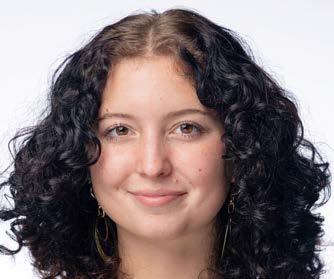
What’s best about your student worker job?
I love the flexibility, as well as the kindness of my superiors.
In what campus activities/clubs are you involved?
How have you changed because of being a student worker?
I’ve become more knowledgeable about the resources of Student Academic Success.
What impact has being a student worker had on your college experience?
ORAMA Marketing Association, Beta Alpha Psi, Omicron Delta Epsilon, PCBE, SFA.
What kind of student worker are you?
CLASS Tutor
What is your official academic year?
Bachelor’s Degree - Senior
What is your academic school?
Camden College of Arts and Sciences
What is your academic major?
Financial Economics
What is your academic minor?
Statistics
Campus Center Social Media Committee(Communications Coordinator), Campus Activities Board(President).
Jonathan Ma Faith Mitchell
What skills have you developed because of your student worker job?
The importance of setting a good schedule and reaching out when I cannot solve a problem.
What is a challenge you face as a student worker?
Most of the tutoring I do is barely subject related but rather remedial math skills. Instead of focusing on computation, I like to teach statistical software so the subject isn’t stressful.
It made me realize the education disparity between different urban/ rural groups and gave me an idea on how I want to implement change.
What is something you have become good at doing after becoming a student worker?
Discussing course layout with professors to change the stRUCture to meet in-demand skills.
“[Being a student worker] made me realize the education disparity between different urban/rural groups and gave me an idea on how I want to implement change.”
What kind of student worker are you?
Marketing Intern
What is your official academic year?
Bachelor’s Degree - Junior
What is your academic school?
The School of Business
What is your academic major?
Business Management
What is your academic minor?
Music
What are your hobbies/interests?
Nutrition, Yoga, Art
What skills have you developed because of your student worker job?
I’ve learned the resources that are available on campus, like OSDFA, which helped me apply for the Gilman Scholarship.
What is a challenge you face as a student worker?
I had to film some interviews within a week, which was challenging because the interviewees availability did not match up with mine. But I was able to rearrange my schedule accordingly and get it done!
It’s given me a wonderful experience, and has connected me with those I would not have met on my own.
What is something you have become good at doing after becoming a student worker?
I’ve been less headstrong and can now ask for help and confide in advisors easier.
“I’ve learned the resources that are available on campus, like OSDFA, which helped me apply for the Gilman Scholarship.”

What kind of student worker are you?
TRiO Ambassador
What is your official academic year?
Bachelor’s Degree - Junior
What is your academic school?
Camden College of Arts and Sciences
What is your academic major?
Criminal Justice & Global Studies
What is your academic minor? Legal Studies
What are your hobbies/interests?
Cooking, Networking, Trying new things, Track & Field
What’s best about your student worker job?
I have the opportunity to learn new things in this field of work and also be a student.
In what campus activities/clubs are you involved?
Executive Senator for Student Government & Vice President for NAACP.
What skills have you developed because of your student worker job?
Time Management.
What is a challenge you face as a student worker?
Managing my time with work, school, sports, organizations, and social life.
How have you changed because of being a student worker?
Being a student worker can bring a lot of personal growth. Working while studying typically helps you learn time management skills, balancing work responsibilities with academic commitments.
It also builds resilience and adaptability as you handle challenges from both areas. You likely develop professional skills like communication, teamwork, and problem-solving, which can help in future careers. It can also deepen your sense of responsibility, as you’re accountable to both your job and your studies.
What impact has being a student worker had on your college experience?
Being a student worker enhanced my college experience by teaching me valuable time management skills and increasing my sense of responsibility. It also allowed me to connect with more people on campus, enriching my personal and professional network.
What is something you have become good at doing after becoming a student worker?
Being a leader and teamworker at the same time.

Paul Boyd
What kind of student worker are you?
TRiO Ambassador
What is your official academic year?
Bachelor’s Degree - Senior What is your academic school?
Camden College of Arts and Sciences
What is your academic major? Philosophy
What is your academic minor? Religion
What are your hobbies/interests?
Reading, spending time with family and friends, spending time in nature and surfing.
What’s best about your student worker job?
I get to help people realize the potential that exists within them.
In what campus activities/clubs are you involved?
I am the treasurer of the Hillel club. I am a member of the Mountainview Community.
A member of S.H.O.P. I’m a member the Vice Chancellor’s External Governmental Affairs Committee. I am a Centennial Celebration Committee member.
I’m on the President’s Student Advisory Committee. I am a TRIO Ambassador and also a member. I do a podcast on Tuesdays called “Beyond Babel” at the University’s radio station. I am a member of Tri Alpha Alpha a first gen student honor society. I am also a member of the National Society of leadership and Success.
What skills have you developed because of your student worker job?
I have learned how to intentionally listen.
What is a challenge you face as a student worker?
One of my biggest challenges as a student worker was overcoming imposter syndrome. As an older student, working alongside younger peers sometimes felt daunting. However, I conquered
this by resolving that others’ opinions about my age didn’t matter; what truly mattered was my effectiveness in supporting and helping my peers.
How have you changed because of being a student worker?
Evolution is part of my nature, so being a student worker hasn’t necessarily been a catalyst for that growth. However, it has broadened my perspective, particularly in finding ways to encourage my peers to engage more with the university and the world around them. What impact has being a student worker had on your college experience?
Being a student worker has brought me joy because helping others has always been a deep passion of mine. While the pay at this level isn’t much—though I am grateful — I do it because I truly enjoy it. This role has made my college experience much more fulfilling.
What is something you have become good at doing after becoming a student worker?
I have improved my ability to communicate effectively with people from all walks of life.

both my professional and personal life. Being able to multitask and stay focused has proven invaluable, especially when juggling multiple responsibilities at once.
What is a challenge you face as a student worker?
on my own — skills I hadn’t really developed before. I learned to be more resourceful, think on my feet, and make decisions under pressure.
What impact has being a student worker had on your college experience?
What kind of student worker are you?
Peer Academic Coach
What is your official academic year?
Bachelor’s Degree - Junior
What is your academic school?
The School of Business
What is your academic major? Business Law
What are your hobbies/interests?
Lacrosse and esthetician school
What’s best about your student worker job?
Being a student worker often means you’re part of a team with others who are in the same stage of life, which can make the work environment more social and supportive.
What skills have you developed because of your student worker job?
One skill I developed as a student worker that I use in real life is time management. Balancing work, classes, and personal responsibilities taught me how to prioritize tasks, manage deadlines, and stay organized. It helped me break larger projects into manageable steps and adjust when unexpected challenges came up, skills that have been essential in
One challenge I faced as a student worker was managing my time effectively when unexpected tasks or last-minute assignments popped up. Since I was juggling work with a full academic schedule, it could be overwhelming to keep up with both responsibilities. To navigate this, I had to develop a proactive approach. First, I started using a planner to map out my weekly commitments — both work and school-related — and built in buffer time for emergencies. I also became more comfortable communicating with supervisors about deadlines and workloads, which helped set realistic expectations on both ends. If I ever felt overwhelmed, I’d ask for help or delegate tasks where possible, which taught me the importance of teamwork and transparency. By organizing my time and communicating openly, I became better at balancing multiple priorities, which helped me succeed both in my job and in my studies.
How have you changed because of being a student worker?
Being a student worker definitely shaped me in several ways, especially in terms of responsibility and self-reliance. One of the biggest changes is how I approach challenges now. As a student worker, I had to take initiative, manage multiple tasks at once, and find solutions to problems
Being a student worker had a significant impact on my college experience. It helped me develop strong time management skills, allowing me to balance academics, work, and personal life more effectively. It also gave me practical work experience that complemented my studies, enhancing my ability to apply what I was learning in a realworld setting. Additionally, it helped me build professional relationships and develop a sense of responsibility, which boosted my confidence and preparedness for post-graduation life. Overall, it made me more organized, accountable, and ready for future challenges.
What is something you have become good at doing after becoming a student worker?
Something I’ve become better at after becoming a student worker is communicating effectively, especially in a professional setting. As a student worker, I was often the point of contact for various tasks, so I had to learn how to clearly communicate my ideas, ask the right questions, and follow up when necessary. This helped me become more confident in both written and verbal communication, a skill I now use in almost every situation—whether I’m collaborating with colleagues, presenting ideas, or just managing day-to-day responsibilities.
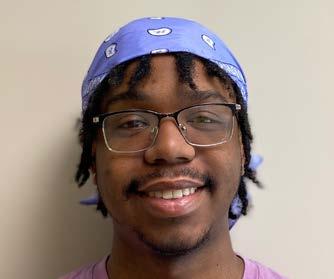
from this job is learning how to be a coach. Whether it be academically or just in everyday life, learning how to navigate people’s challenges and come up with solutions is something that I’ve been able to make use of even in my personal life. I always prided myself on being a reliable person for people to talk too, and now with this skill that I have gained I’m able to help in more ways than just listening.
What kind of student worker are you?
Peer Academic Coach
What is your official academic year?
Bachelor’s Degree - Junior
What is your academic school?
Camden College of Arts and Sciences
What is your academic major? English
What is your academic minor? Music
What are your hobbies/interests?
Making music, acting, and reading comics
What’s best about your student worker job?
Getting to help students who were in similar positions as me.
In what campus activities/clubs are you involved?
WCCR (Radio personality), Theater Department (Rocky Horror Music Show).
What skills have you developed because of your student worker job?
The skill that I treasure the most
What is a challenge you face as a student worker?
The most challenging thing is holding myself accountable and being on top of my own academics. In order to confidently give other students advice I have to make sure that I am “living what I preach.” While it has been a challenge, it is a welcome one and has helped me to find joy in doing the work necessary to be a good role model.
How have you changed because of being a student worker?
In terms of academics, I would say that I improved greatly. I was once on Academic Probation for a whole year and now this semester is shaping up to be my best academic performance in my Rutgers tenure so far. I have a really good outlook on things and am excited about what’s to come. And in terms of my personal, I don’t think I’ve changed much. The beautiful thing about my job as a PAC is that it doesn’t
require me to change my whole personality in order to be a part of it. Instead, I am encouraged to be my truest self and use my personal experience in order to help me be better at this job, which is really refreshing.
What impact has being a student worker had on your college experience?
If I wasn’t a student worker I genuinely do believe that my college experience may have ended after my first year. This job has changed my mindset and is aiding me in making the strides to getting my degree. This job has been a wonderous experience and I cannot wait to continue on the path and see what new opportunities await. What is something you have become good at doing after becoming a student worker?
I have become a lot better at managing my hobbies with my academics since starting this job. I used to struggle with balancing both of those “sides” of myself, but having to learn different skills to teach students has also helped me improve myself.
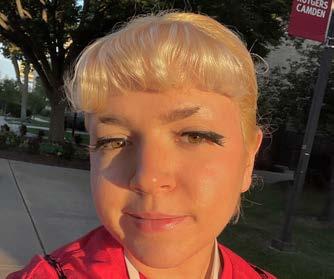
What’s best about your student worker job?
The best part for me is getting the chance to work alongside staff that care for student success.
In what campus activities/clubs are you involved?
I’m on the RU-C cheerleading team, and I’m involved in Animation Alliance.
work hours. I ended up having to cut some social time out of my daily routines to ensure I had enough time to do school work.
How have you changed because of being a student worker?
I’ve changed in the sense that I’ve become more responsible.

What are your hobbies/interests?
Reading, puzzles, crochet
In what campus activities/clubs are you involved?
STEM Olympiads and Women in STEM.
What skills have you developed because of your student worker job?
learning, personal growth, and resilience. In seeing these qualities in my peers, I have developed these qualities in myself.
What impact has being a student worker had on your college experience?
Leyna Nguyen Taylor Spencer
What kind of student worker are you?
TRiO Ambassador
What is your official academic year?
Bachelor’s Degree - Sophomore
What is your academic school?
The School of Business
What is your academic major? Animation
What are your hobbies/interests?
3D Design, sewing, fashion
What skills have you developed because of your student worker job?
The skill to time manage is something I’ve learned since joining.
What is a challenge you face as a student worker?
Sometimes it is challenging to balance work and school work with a social life. I had to make sure I was still making enough time to study and do homework around
What impact has being a student worker had on your college experience?
Being a student worker opened me up to the community and made me feel more connected to RU-C than I did before.
What is something you have become good at doing after becoming a student worker?
I have become better at studying since becoming a student worker.
“Being a student worker opened me up to the community and made me feel more connected to RU-C than I
did before.”
What kind of student worker are you? CLASS Tutor
What is your official academic year? Bachelor’s Degree - Junior
What is your academic school? Camden College of Arts and Sciences
What is your academic major? Biology
What is your academic minor? Chemistry
I learned how to explain complex concepts in clear, accessible ways.
What is a challenge you face as a student worker?
Sometimes students expect to cover multiple lectures worth of content during a tutoring session. I learned to navigate these situations by setting realistic expectations and breaking down content into manageable parts.
How have you changed because of being a student worker?
My experience as a peer tutor has given me a new perspective on
This role is extremely fulfilling as I’ve helped numerous students improve their understanding and grades.
What is something you have become good at doing after becoming a student worker?
I have improved in my communication and leadership skills.
“My experience as a peer tutor has given me a new perspective on learning, personal growth, and resilience.”

What kind of student worker are you?
CLASS Tutor
What is your official academic year?
Bachelor’s Degree - Junior
What is your academic school?
The School of Nursing
What is your academic major?
Nursing
What are your hobbies/interests?
Crafts, thrifting, studying
What’s best about your student worker job?
Being able to help students understand concepts that they were confused on.
What skills have you developed because of your student worker job?
When faced with a large and intimidating amount of information, it is important to break it into digestible amounts and spread it out over time.
What is a challenge you face as a student worker?
Balancing all of my time has been difficult, but I now block my day by the hour and it makes everything a lot easier.
How have you changed because of being a student worker?
I am much more aware of the different backgrounds of knowledge that students come from and to not have judgement.
What impact has being a student worker had on your college experience?
It has made me feel valuable and appreciated. I’m glad my knowledge has benefitted others.
What is something you have become good at doing after becoming a student worker?
Responding to students in time of stress! I have a much better gauge of how to face it then when I started tutoring.
The SAS employees are outstandingly proud of our student workers, and we look forward to being a part of and supporting their continued success!
According to McKinney (2021), while professional staff assign and supervise work tasks and duties for student workers that develop and refine communication and problem-solving skills, professional staff do so much more; they build meaningful-impactful-lasting relationships with, advocate and care for, and comfort and guide student workers.
National Student Employment Week is April 14th – 18th, 2025, and we are planning events to bring awareness about student workers, assist student workers in building and fostering community, and celebrating our student workers.
If you are a current student worker for the SAS Division wanting to submit your profile information, please be on the lookout for the call each semester for student worker profiles. If you are interested in becoming a student worker for the SAS Division, please send an email indicating your interest to Emily Carlin by clicking here

The CSI (College Student Inventory) is a national survey instrument that Rutgers–Camden distributes to incoming first-year and transfer students during the summer/winter prior to matriculating.
It asks students to report on their academic, social, and personal experiences.
The survey is managed by Student Success vendor Ruffalo Noel-Levitz. Student Academic Success specifically uses the information to gain insights on students’ individual responses, as well as using the survey’s normalized scales to determine risk and differentiate levels of support. The Office of Data Analytics & Campus Planning assists with yearly trends, correlations, and predictive impact. Now in its third year of collection, SAS has been able to identify cohort-wide trends that inform support needs across campus.
Selecting an Adacemic Program
Discuss Career Qualifications
Discuss the Job Market
Career Advantages/Disadvantages
Help with Study Habits
Help Meeting New Friends
Help Selecting a Career
Help with Exam Skills
Info about Clubs & Orgs
Selecting an Adacemic Program
Discuss Career Qualifications
Discuss the Job Market
Help Meeting New Friends
Info about Clubs & Orgs
Help with Study Habits
Help with Exam Skills
Career Advantages/Disadvantages
Get Advice from an Experienced Student
Help Obtaining a Scholarship
Help Selecting a Career
Selecting an Adacemic Program
Discuss Career Qualifications
Discuss the Job Market
Help Selecting a Career
Career Advantages/Disadvantages
Help Obtaining a Scholarship
Help with Study Habits
Help Meeting New Friends
Help with Exam Skills
Info about Clubs & Orgs OVERALL (2024) FIRST TIME IN COLLEGE STUDENTS (2024)TRANSFER STUDENT (2024)
Insights gained year-over-year include the following:
Selecting an Academic Program remains steadfast at #1 in terms of student topics in which they are most receptive to support. Students want guidance about which courses to take, how their academics fit into their vision for the future, and what requirements they need to meet to graduate.
Cross-Functional Fact: Students who meet with their academic advisor at least once in their first year on campus retain at a rate almost 50-75 points higher than their peers who do not do so.
Discussing Career Qualifications and the Job Market hold steady at #’s 2 and 3 from 2022 until now. Academics and career advice are closely connected for our students, and they are seeking help in navigating the unknown in these landscapes to achieve their goals.
Cross-Functional Fact: CCAS students are much more likely to go straight to graduate school after graduating (54% of respondents from the First Destination Survey for the Class of 2022), versus Business and Nursing who tend to be employed part- or full-time (80-90%) after earning their degree.
Differences in admit type influences the priorities that students place on the types of supports they want from staff – students who are enrolling in college for the first time preferred help meeting new friends and finding clubs & organizations, whereas transfer students who have college experience prioritized career topics above community building — preferring help with weighing and selecting career options.
Cross-Functional Fact: Transfer students make up about half of the undergraduate population. The narratives that we use to shape our assumptions about what students need across campus must include both first-year and transfer student voices, in addition to other demographics that may depart from traditional college trajectories.
Help with study habits and exam skills both climbed the ladder this past year, with students more open to receiving academic support than in previous years.
Cross-Functional Fact: Over half of the students who earned an A in this past Fall’s Anatomy & Physiology I course (a known difficult course), participated in a program offered by SAS’s CLASS office including coursespecific skill-building and reviews.
How SAS is doing its part to support our students
November 8th is designated First-Gen Celebration Day by the Council for Opportunity in Education and NASPA’s First-Gen Forward. This day is an opportunity for colleges, universities, and organizations to recognize and celebrate the first-generation college student identity and their experiences. At Rutgers-Camden, firstgeneration is defined as a person whose parent(s) or guardian(s) did not complete a four-year degree. Over 50% of our undergraduate student population fall into this category.
The SAS Division has been honoring First-Gen Celebration Day with a week-long series of events since 2019. Each year, our goal is to host events that elevate and celebrate the unique identities and experiences of our firstgen student community on campus. For 2024’s celebration week, we continued this tradition with events that provided space for students to share their experiences and connect with the first-gen community.
• 91% of students are interested in doing an internship related to their major before graduating
• 69% are interested in taking a course that engages with the local community.
• 17% spend 20 hours or more taking care of family members (children, parents, siblings, etc.)
• 35% plan to work 20 hours or more each week
In addition to using the above topics to inform programming content, events, and group activities, stakeholders who meet with student caseloads can reinforce the individualized recommendations provided by the CSI Report. Any student who completed the survey in the past two years has had their report uploaded to their profile in Navigate, which is accessible by the student by using the Navigate360 app or website to log in. To request an aggregate report of your students’ response trends, contact Lindsay Peck by clicking here.
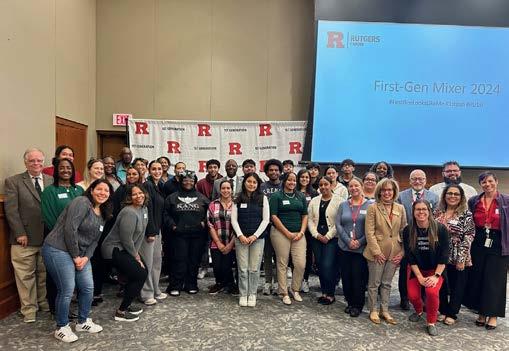
Monday, November 4, 2024
The First-Gen Mixer is an annual tradition that kicked off our first-gen week of celebrations by providing an opportunity for our first-gen students, staff, faculty, and alumni to share their stories and build community with one another. NJ Assemblyman William Spearman, a representative of the Fifth District, a Rutgers-Camden alum, and a firstgeneration college student, kicked off the event with words of advice and encouragement for our students – emphasizing the importance of pushing forward in the face of obstacles to meet your goals. RU-C faculty/staff/ alumni lead small group discussions related to the intersection of the first-gen identity, building community/ support, and life after college. Finally, Junisse Ventura, Co-President of Tri-Alpha (National First-Gen Honor Society), ended the evening with a beautiful and motivating speech about how being first-gen can be a source of struggle but more so serves as a point of pride and motivation for excellencegen student community on campus. For 2024’s celebration week, we continued this tradition with events that provided space for students to share their experiences and connect with the first-gen community.
Thursday, November 7, 2024
SAS supported the student organization Bridging 1st Generation Students (B1GS) who hosted their inaugural Sneaker Ball to close out the week. A sneaker ball is an event where guests wear sneakers with more formal attire. This program provided a space for first-generation students to de-stress and be in community with peers. The students held a game of first-gen trivia and a “best sneaker” competition, gave away prizes, and danced the night away with some of the freshest kicks.

Throughout the week, we provided opportunities both in person and via our social media, for first-gen students to share their stories of being first-gen. Check out a couple of the highlights below:
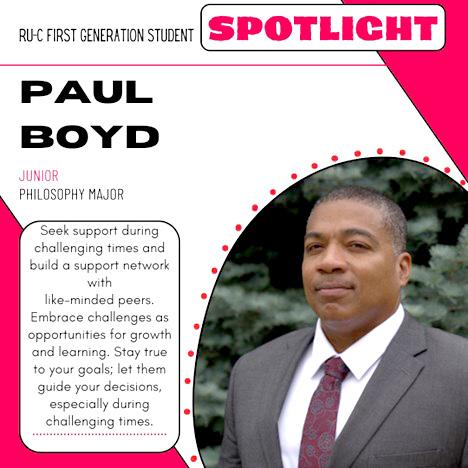

Every year, the Educational Opportunity Fund (EOF) Programs welcome incoming first-year students admitted to Rutgers University–Camden through an extensive 4-week residential summer program. As a condition of their admission, students participate in this program to acclimate to university life by taking a 3-credit course, connecting with campus partners and resources, and building a sense of belonging to the university and the EOF program.
Out of this tradition was born Building Bridges: Connecting with Camden, an initiative developed by Senior Student Programs Coordinator, Mr. Angel J. Perez. This summer project offered students the opportunity to engage with Camden City’s vibrant community, highlighting its resilience and beauty.
Between July 8th and August 2nd 2024, participants – 44 incoming first-year students, including EOF participants and Memphis Pipeline Project students – were divided into seven groups and paired with one of Camden’s most impactful organizations. These collaborations showcased the vital services provided to the city and the broader Camden County area, empowering students to connect deeply with their surroundings while learning about social responsibility and engagement.
Throughout the program, students conducted research, engaged in conversations with community leaders, and visited organizations in person. These experiences provided insights into the transformative work happening in Camden, inspiring students to embrace civic responsibility and deepen their connection to their new community.
The program culminated in a Closing Ceremony, where students delivered seven group presentations to campus partners, family members, and representatives from each organization. The ceremony celebrated the students’ achievements and highlighted the lasting impact of the program.
From this experience, we want to highlight a feature presentation: Center for Environmental Transformation (CFET). The CFET group focused on exploring the organization’s work in environmental justice, food insecurity, and urban farming. The students engaged with CFET’s community-driven initiatives, learning how the organization empowers residents of Camden to advocate for healthier environments and sustainable food practices.
The student group members were: Ariana Collado, Sanaa Williams, Nohj McNair, Sterlyn Garcia, Aniel Muniz, Lanisha Vogt, and Eduardo Samaniego. Experience the incredible work and insights of this group by watching their presentation below.

The Educational Opportunity Fund (EOF) Program at Rutgers University–Camden is proud to announce the approval of two special projects for the 2024-2025 academic year: MOOD (Men/Males Overcoming Obstacles Daily) and Women Empowering Women: Women of Color Affinity Group. These initiatives were developed to address the unique challenges faced by EOF students and to provide opportunities for growth, empowerment, and connection.
Both projects aim to foster a sense of belonging and community, empower students to navigate systemic barriers, and provide meaningful opportunities to engage in leadership and professional development.
MOOD (Men/Males Overcoming Obstacles Daily)
Purpose: MOOD focuses on supporting Black and Latinx male students in the EOF program by addressing social and systemic barriers, fostering community connections, and enhancing personal and professional growth. While its primary focus is on Black and Latinx males, MOOD also welcomes allies and supporters, creating a space for collaborative learning and shared experiences to uplift and empower this community.
Purpose: This initiative provides a safe and supportive space for female-identifying students of color to connect, share experiences, and address challenges such as imposter syndrome and racial discrimination. The program emphasizes creating a sense of belonging, professional skillbuilding, and empowering participants to lead both on and off campus.
This year, EOF students had the opportunity to attend two impactful conferences that supported the goals of these special projects.
The Engage Educate Empower Summit, held on October 4, 2024, at the Community College of Philadelphia, was an enriching experience for EOF students. Led by Sr. Student Programs
Coordinator, Mr. Perez, the group participated in sessions centered on student empowerment, equity in education, and creating inclusive spaces. Students actively engaged in discussions, sharing their own stories and strategies for success. The event fostered a strong sense of community and inspired students to take greater ownership of their educational journeys.
On November 7, 2024, at the Pennsylvania Convention Center in Philadelphia, PA, Mrs. Waters and Ms. Gibbons, both EOF Senior Counselors, accompanied the Women Empowering Women group to the Pennsylvania Conference for Women. The event featured renowned speakers, interactive workshops, and panels designed to empower women in leadership and career development. Students left the conference inspired and equipped with actionable strategies to overcome challenges they face as women of color in higher education. Networking opportunities allowed students to connect with professionals, mentors, and peers, further enhancing their experience.
Both events provided valuable learning experiences for EOF students. At the Engage Educate Empower Summit, students gained tools to advocate for equity and inclusivity in their academic spaces. Meanwhile, the Pennsylvania Conference for Women reinforced the importance of representation and community building, leaving attendees motivated to take on leadership roles in their academic and professional lives.
In the Division of Student Academic Success, the role of our coaching and counseling teams are pivotal in guiding students through their academic and personal success journeys. Through personalized, one-on-one meetings, success coaches and student counselors provide tailored support that addresses individual needs and challenges. Here, we profile three students who have experienced the transformative benefits of this customized approach.


Deptford, New Jersey
To begin his interview, Albert reflected on his initial struggles when he first entered college, particularly with adapting to new study habits as a first-generation student. “Christian, my TRIO counselor, was always giving me new study habits, advice, and reflecting on how he was studying when he was a student here at Rutgers. That’s what really helped me out,” Albert shares. Beyond academics, Christian’s support extended to personal issues, offering a safe space for Albert to discuss family and mental health challenges. “I feel more vulnerable that I can talk to somebody just one-on-one. Nobody else is listening. I’m able to say what I really want to say, and everything that’s on my mind.” he adds, highlighting the importance of individualized attention.


For Joanamary Chavez, balancing motherhood and academics posed significant challenges. Her coaching sessions played a cRU-Cial role in helping her journey towards graduation. “They helped me become organized and stay on track so that I could be a mother and be in school at the same time,” Joanamary explains. The individualized nature of the sessions also helped her build up her confidence, as well. “One-on-one coaching has helped me open up more with people. First, it started with my counselor and then it started with my professors and those around me,” she notes.
First-Year Transition Programs support student success and engagement by helping brand new students tackle academic and cultural adjustments in an inclusive, supportive, and fun environment. These programs help deepen scholars’ connection to the university by fostering early relationships between staff, campus resources, and peers.
Gloria Bolaji Freshman, Pre-Nursing
Major North
Brunswick, New Jersey
As a freshman, Gloria Bolaji faced the daunting task of navigating her new academic environment. Coach Ashanti’s guidance was instrumental in helping her create a manageable schedule and adjust to college life. “When I came here, I was scared. I didn’t know how to really move around my classes or how to schedule my classes, so I have enough time to do other things,” Gloria recalls. The personalized support she received not only improved her academic performance but also boosted her confidence. “With the one-on-one coaching, helping me realize my goals, what I need to do at my time in Rutgers, it helped me become more of a confident person,” she says.
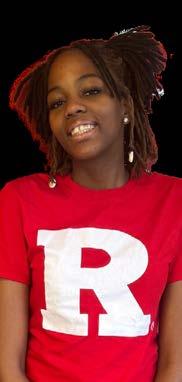

The testimonies of Albert, Joanamary, and Gloria underscore the profound impact of one-on-one success coaching at Rutgers University–Camden. These personalized sessions provide a safe space for students to discuss their challenges, receive tailored advice, and build the confidence needed to thrive both academically and personally. As Gloria puts it, “Knowing I have that support behind my back on campus is really helpful to me.” The success coaching model continues to be a vital resource for students, fostering a supportive and empowering environment that helps them achieve their full potential.
Additionally, prioritization on academic and soft skill building assists incoming students with the academic adjustments and necessity of self-efficacy needed to reach success during their first year on campus. This is particularly important at Rutgers University Camden where roughly 55% of our student population identifies as first-generation.
This past summer, the Division of Student Academic Success played an integral part of New Student Orientation, also known on campus as SOAR. Specifically, the Student Success Coach Office (SSCO) led several student-centered sessions to help foster a sense of belonging and empower self-efficacy and academic responsibility. Some highlights included two brandnew sessions. One focused on helping the incoming students understand how to navigate the various technological systems and applications at the institution to ensure their ability to effectively leverage these resources. A second SSCO session titled “The Secret to College Success” focused on community building, identifying institutional resources, and applying strategies to overcome challenges through a growth mindset.
Data has since shown that 81% of orientation participants reported feeling comfortable navigating RU-C apps and technology as a part of attending the workshop, helping to curve some of the challenges with understanding how to access important education tools and campus resources. Additionally, 85% of orientation participants expressed identifying a new habit or mindset that they plan to adopt to help them succeed and 87% indicated identifying and interacting with at least one staff member/ campus resource they plan to utilize during their first semester on campus.
The long-term benefits of building trusted relationships early in a student’s academic career cannot be understated. With a proactive approach and emphasis on building relationships, early and frequent interactions with students benefit overall student academic success and retention. The SSCO continued their engagement with first-year students throughout the summer by holding 1:1 appointments with incoming scholars and hosting a new iteration of the Summer Bridge Program.
The Student Success Coach Office’s Summer Bridge program is offered to all incoming first-year students to assist them with navigating their entrance to Rutgers- Camden. The 2024 Summer Bridge cohort consisted of over 70 residential and commuter first-year students participating in multiple workshops, panels, and activities throughout the 5-day program the week before the semester began. The objectives of this transition initiative are to acclimate students to institutional culture and resources, foster relationship building with faculty, staff and peers, promote experiential learning, identify strengths and potential barriers to success, and strengthen academic preparedness and motivation. At the end of the week-long program, students were asked to provide feedback about their experiences and the skills gained. 95% of students reported being able to identify 2 new study skills, 91% of students stated participation in Summer Bridge assisted them with their sense of belonging on campus, and 98% stated they felt more confident in asking for help when in need and navigating campus resources.


Katelynn Aurelus, a first-year nursing major, shared, “This entire experience has alleviated any and all anxiety I’ve felt about starting college. I’ve made so many connections and genuine relationships with many of the people here. I am so grateful that I feel prepared for all my classes and necessary steps to ensure my success. I learned what to do when I don’t know what to do and that is so important.”
Visual Arts major Gavin Lourenco stated that “Coming in early helped the transition into college,” while Theater Arts major Aubre House shared, “This was a really great program and I’m so glad I experienced it! Even with it being only 4.5 days I already know my way around campus, made connections with peers and staff and understand where my support systems are.”

Building coalitions among faculty, staff, administrators, student organizations, and community partners helps create a more comprehensive support system to combat the wide array of academic, social, emotional, and financial challenges students face.
By pooling resources and expertise, these groups can address students’ diverse needs which are all critical to student success. Strengthening partnerships has allowed SAS to create a supportive campus culture to help foster sense of belonging and increase the persistence of our Latinx students. As Rutgers-Camden progresses toward designation as a Hispanic-Serving Institution, the university is committed to providing high-impact opportunities to develop, educate, and empower emerging Latinx scholars.
As part of Hispanic Heritage Month, the student organization HombRes and the Division of Student Academic Success held the inaugural Escaleras Summit. RU-C undergraduates and high school students from Camden’s LEAP Academy engaged with faculty, alumni, staff, and students through workshop sessions and career panels. Those collaborators included professors Andrew Abeyta, Silva Perez-Cortes, and Jose Beltran –all bringing their scholarship and expertise to inform our scholars.
Students discussed topics including linguistic and cultural bias, organizational integrity and ethics, combatting productivity culture and burnout, and managing
gendered expectations of humility as Latin women.
“The Escaleras Summit was a very beautiful and important leadership conference that helped me and my peers grow as leaders and professionals,” said Yoel Bernard, a business management major and vice president of HombRes. “As an individual, it empowered me to take the initiative and be a role model to others, especially those from my high school, LEAP Academy. I look forward to similar events that help promote leadership and empowerment for the Latinx community in Camden.”
An intentional collaboration with the Latin Alumni Association of Rutgers University allowed for eight alumni across varying industries to share their career journeys as Hispanic professionals. Freshman criminal justice major Syphera Villanueva felt inspired by the alumni panelists. “The summit was inspiring and motivational,” Villanueva said. “Being minorities, we do not get the same opportunities as others, but talking to the panelists and other students influenced me to believe that I can succeed with the help of people to guide and support me along the way.”

Dr. Silvia Perez-Cortes, Associate Professor of Spanish at RU-C, offers some reflections on the summit experience:
“This year, I had the pleasure of participating in the 1st Escaleras Summit, a new initiative that supports and celebrates RU-C Latinx students during Hispanic Heritage Month which allowed students, faculty, and staff to connect outside of the classroom to discuss issues that affect their lives and that have an impact on their academic and personal well-being. The organization of these types of events is extremely positive for everyone that participates in them. Students have a safe space to work on their leadership skills, connect with peers who share the same cultural background and experiences, and be seen and heard within the campus community. These events also provide professors like me with the opportunity to meet with students outside of the classroom and strengthen our connections and understanding of their aspirations, fears, and the most common barriers that they encounter. This invaluable information can help us make curricular decisions, improve our rapport with students, and create a community where different stakeholders are more attuned to one another. I can’t wait to work alongside staff, faculty and students in organizing another Escaleras summit next year!”
The Office of Scholar Development and Fellowship Advising (OSDFA) has supported several applicants whose successes we are thrilled to share with you here.
In September 2024, OSDFA supported four Rutgers-Camden alumni as they completed and submitted their applications to the Schwarzman Scholars program, a prestigious program based at Tsinghua University in Beijing China that aims to build a community of global leaders. Three of our applicants were named finalists and interviewed in New York City in November. In a historic turn of events, Rutgers-Camden Alumna Tania Martinez has been named a Schwarzman Scholar, the first for our campus, and from the largest pool of applicants to date in the 10-year history of this award, Rutgers is proudly represented with scholars named from each of our three Rutgers campuses. Tania and other selected scholars will spend one year in China receiving a fully funded master’s degree in Global Affairs and engaging in world-class leadership experiences.


In October 2024, Amaya Solar (CCAS ‘27) was Rutgers-Camden’s first student selected to participate in the annual Public Policy Leadership Conference (PPLC) at the Harvard Kennedy School. PPLC is a highly selective program that brings together talented undergraduates from around the country who are interested in pursuing graduate studies in public policy.
Also in October, 9 Rutgers-Camden applicants “hit submit” on their Fulbright US Student award applications; a 12.5% increase from last cycle. These individuals are current seniors, current graduate students, and Rutgers-Camden alumni who applied to countries across the globe, including Bosnia, Brazil, Indonesia, Jordan, Rwanda, South Korea, and Wales (UK). Applicants will be reviewed by a US panel of experts this fall, with “semi-finalist” status announcements expected in January and final awards available in late Spring. We also extend our sincere thanks to the 10 committee members, faculty and staff from across the campus, who supported these applicants this year.
Additionally, our team set an intention for this year to increase the number of Rutgers-Camden undergraduates applying for the Gilman Scholarship, and wow did we achieve that goal! For the October 2024 Gilman deadline, we saw 22 students hit submit on their applications, a record high for our campus. Compared to one year ago, there was a 150% increase in the number of students who opened applications and a 633% increase in the number of students who submitted their applications. In December, it was announced that four RutgersCamden students were awarded the Gilman Scholarship to support their international endeavors. These students are among the 1600 selected recipients from a pool of more than 7100 applicants! Our representation is on-par with national statistics, with 18% of RU-C applicants awarded (national average is 22%) & 75% of RU-C recipients identifying as 1st generation compared to about half of national Gilman recipients.

In November 2024, Jochebed Peace Airede (CCAS ‘24) was named a finalist for the Rhodes West-Africa Scholarship to study at Oxford University. Soon after, she interviewed with Rhodes selectors in Lagos, Nigeria at which time Ms. Airede was named “alternate” for the award, earning the top placement for a nonscholar. We are bursting with pride for this recognition and achievement for Ms. Airede who continues to proudly represent RutgersCamden on a global scale.
Also in November, we saw tremendous growth in the number of students applying to the Critical Language Scholarship. Compared to one-year-ago, we saw a 171% increase in the number of applications opened and a 300% increase in the number of applications submitted. In early January, four Rutgers-Camden students were named semifinalists. We look forward to celebrating all these applicants during our annual “You Hit Submit” celebration on April 16, 2025!

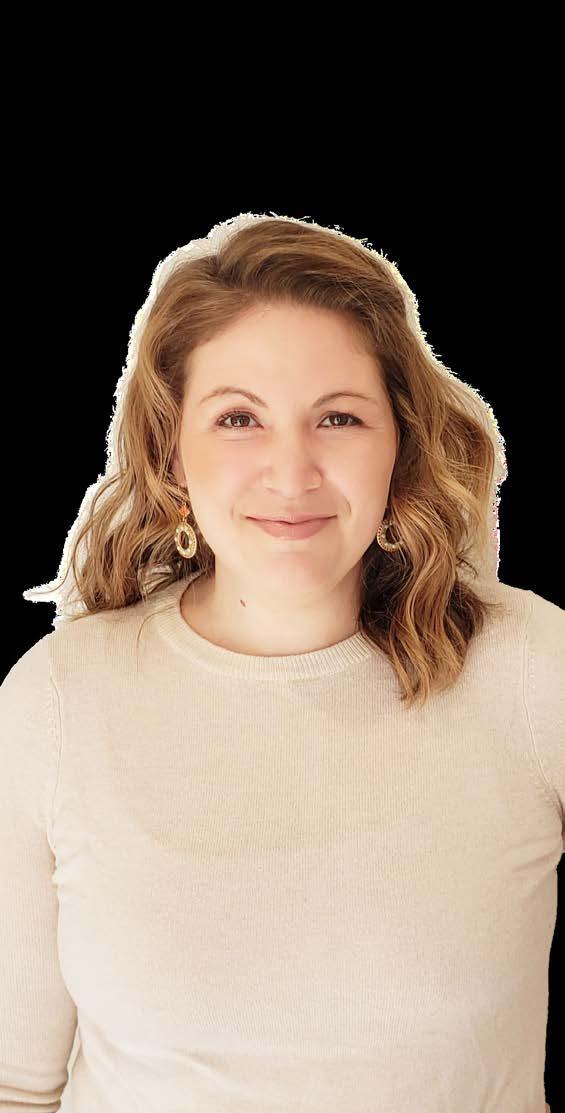

Laura Collins, founding director of OSDFA, was selected to serve as a 2024-2026 Fulbright Program Adviser Mentor.
Ms. Collins was selected from a competitive pool of highly qualified applicants and will represent Rutgers-Camden at conferences, training, and other Fulbright national events.

In November, during International Education Week, OSDFA welcomed representatives from the Fulbright Taiwan program to learn about our campus and exchange information alongside our campus partners, including Provost Dr. Sandra Richtermeyer, Elizabeth Atkins, Associate Dean International Students and Global Programs, and student representatives from SGA, among several other invited guests. OSDFA offered a brief presentation highlighting the successes of our Fulbright applicants, while our Fulbright Taiwan colleagues offered a detailed overview of the multitude of options available to US students interested in visiting Taiwan. This day was a success, in part, because of engaging in meaningful cultural, educational, and professional exchange.

Rutgers–Camden Selected to Host National “Gilman Advisors”
In November, OSDFA prepared and submitted an application to the Institute for International Education (IIE) to host a one-day conference for approximately 50 Gilman Scholarship advisors from across the US. Building on our collaborative nature as a campus, we identified and confirmed participation from several key partners across Rutgers-Camden for this proposal. In December, we learned that IIE selected Rutgers-Camden and our proposal for this prestigious opportunity. We look forward to welcoming our colleagues and to highlighting our incredible students and the outstanding work of our campus.

Near the end of the Spring 2024 semester, OSDFA invited fellowship advisors and adjacent professionals from across our area to participate in a free, 1-Day Professional Development retreat at Rutgers–Camden. This idea emerged informally through connections made during the 2023 National Association of Fellowship Advisors (NAFA) Conference and served as an opportunity to build new connections and share best practices. Fellowship advisors from more than 20 colleges and universities attended this first-of-its-kind event.
Presentations were offered from representatives of institutions including Villanova University, University of Pennsylvania, Haverford College and several other regional colleges and universities. Topics included relevant issues of data-driven approaches to advancing fellowship advising, fellowships as developmental pedagogy, and a final panel conversation featuring representatives from three national foundations (Harry S. Truman Scholarship Foundation, the Boren Awards, and the Schwartzman Scholars).
In their post event reflections, participants cited learning new information, identifying actional steps to implement into their work, and connecting with fellow advisors as the most beneficial aspects of the gathering. One advisor offered, “The small, intimate nature allowed for easy connection and lots of opportunities to ask questions and offer direct feedback. Such a great event!”

Near the end of the Spring 2024 semester, OSDFA invited fellowship advisors and adjacent professionals from across our area to participate in a free, 1-Day Professional Development retreat at Rutgers–Camden. This idea emerged informally through connections made during the 2023 National Association of Fellowship Advisors (NAFA) Conference and served as an opportunity to build new connections and share best practices. Fellowship advisors from more than 20 colleges and universities attended this first-of-its-kind event.
Presentations were offered from representatives of institutions including Villanova University, University of Pennsylvania, Haverford College and several other regional colleges and universities. Topics included relevant issues of data-driven approaches to advancing fellowship advising, fellowships as developmental pedagogy, and a final panel conversation featuring representatives from three national foundations (Harry S. Truman Scholarship Foundation, the Boren Awards, and the Schwartzman Scholars).
In their post event reflections, participants cited learning new information, identifying actional steps to implement into their work, and connecting with fellow advisors as the most beneficial aspects of the gathering. One advisor offered, “The small, intimate nature allowed for easy connection and lots of opportunities to ask questions and offer direct feedback. Such a great event!”


OSDFA is fortunate to be supported by many staff and faculty colleagues, all of whom contribute to our students’ success in transformative ways. As we continue to expand our reach and encourage more students and alumni to pursue these opportunities, we encourage members of our community to join us in these efforts. One (simple!) way you can support our work is through referrals. If you have a student or alumnus that you think would be a good fit for national awards, please submit this form to make your nomination. Another way you can get involved is by participating in our brief (less than 5 minute) survey where you can share your experience with competitive awards and your interest in supporting related scholar development activities.
In addition to our existing social media platforms (Instagram, LinkedIn), OSDFA has added a monthly blog to our outreach efforts. “OSDFA Monthly Musings” features voices from across campus, including interviews with student applicants, commenting on all things OSDFA. Each month, you can expect guest authors, event recaps, news of opportunities and more in our engaging, easy-to-digest newsletter. Subscribe today and ensure you’re always up to date on the latest awards, events, and opportunities!

The transition from high school to college is a pivotal moment for students and many incoming freshmen underestimate the academic rigor required to meet the standards that professors expect. The heavy workload and difficulty of course material can quickly deflate the excitement of college and without the higher-order thinking skills, strong time management and grit necessary to keep pace with the curriculum, they have a much harder time meeting their graduation requirements.
Success in Science was developed to help break this trend. This summer, SAS provided students enrolled in anatomy and physiology an opportunity to increase their academic skills, be introduced to collegelevel science curriculum, particularly anatomy and physiology topics, and practice without the pressure of graded assessments. Success in Science was offered as an online, self-paced, non-credit, asynchronous program accessible through Canvas, Rutgers’ learning
management system. There was no cost to participate, and students were able to participate at their own pace. The course site opened on July 15, 2024. A total of 65 students (nursing, pre-nursing, health science) participated and completed the online Success in Science course. Students indicated that they felt significantly more prepared and able to be successful in their first year of college!



CLASS Tutors are top performers and excellent students in their majors. Some of them are doing more than meeting with students for the scheduled hour - Shaan Mody leads a Study Buddy group for Professor YOUWEN ZHANG’s, General Biochemistry class. Study Buddies is a feature in Navigate, and students accessing Navigate can sign up and add their name to the Study Buddies list for any courses in which they are currently enrolled. Shaan is enrolled in General Biochemistry, and he leads the Study Buddies group for that course. Shaan is also a peer tutor; however, he is leading the Study Buddy group for this course, as a student, while being enrolled in the course.
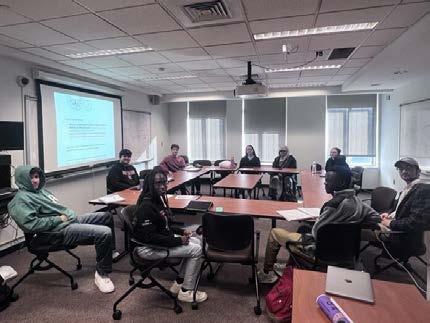
The Peer Academic Coaches (PACs) took a unique spin on Halloween 2024. Instead of Trick or Treat, a Trick “and” Treat inspired event took place on October 31st. By “trick” they meant a student academic success trick / tip – some useful information that students can use to propel success (e.g., implement the 2-minute rule - if a task takes less than 2 minutes; do it immediately).
Each of the nine coaches provided 5 tips, for a total of 45 student success tips, that were included in each treat bag, and each tip was attached to a treat. All students that received a treat bag will be asked in an upcoming survey about how they have used the tricks. The students were impressed and thought the idea was a great way to have fun while engaging in learning. Students who swiped into the event will receive follow-up communication inquiring about how they have implemented the trick.

The Circle of Change Leadership Experience is an annual life-changing and transformational conference for student leaders.
PACs from RU-C had the wonderful opportunity to attend the 15th annual experience that took place November 21st – 24th in Los Angeles, California – California University at Dominguez Hills. The RU-C PACs were able to participate in, to name a couple, leadership empowerment sessions and career development empowerment workshops. Students can receive scholarship awards, and advisors can receive recognition awards. This year, the RU-C PACs had a meaningful experience where they grew, learned, and networked. One of the highlight activities was a barrier breaking simulation experience. On a wooden board, students wrote down barriers they thought were holding them back from being successful. After that, each student broke their board – demonstrating their ability to break through barriers to reach success. And also exciting, our very own Paris Correa was a scholarship award recipient!
Check out these videos of two brilliant RU-C PACs, Besiana Duka and Liva Karasoy, breaking through a board and showing us how to break barriers!


We are delighted to formally welcome the Career Center to the Student Academic Success Division, effective July 2025. This exciting transition strengthens our shared mission of supporting students’ success in their academic and professional journeys. The Career Center has long been a vital resource, offering services such as career counseling, resume and cover letter reviews, internship and job search assistance, job and internship fairs and information sessions, and Handshake user support and training.
One of the Career Center’s standout features is the ability for the staff to bring career development resources and initiatives directly into the classroom. Staff members are available to facilitate workshops and information sessions, both in-person and virtually, tailored to meet the unique needs of students in various fields of study. These sessions cover topics such as career exploration, interview readiness, job and internship fair preparation, and networking strategies, ensuring students are equipped with the tools and confidence they need to succeed. Faculty members and students are encouraged to take advantage of these valuable services to integrate career readiness into their curriculum.
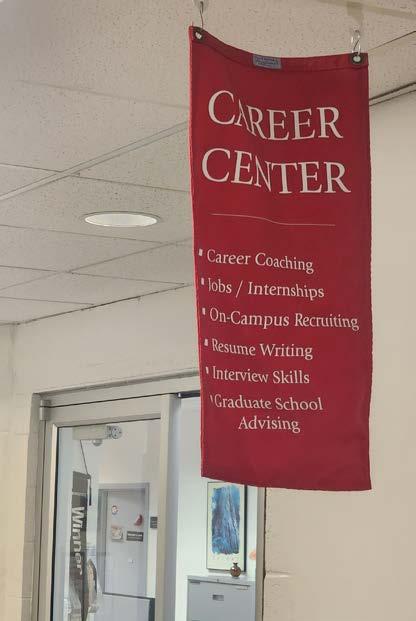
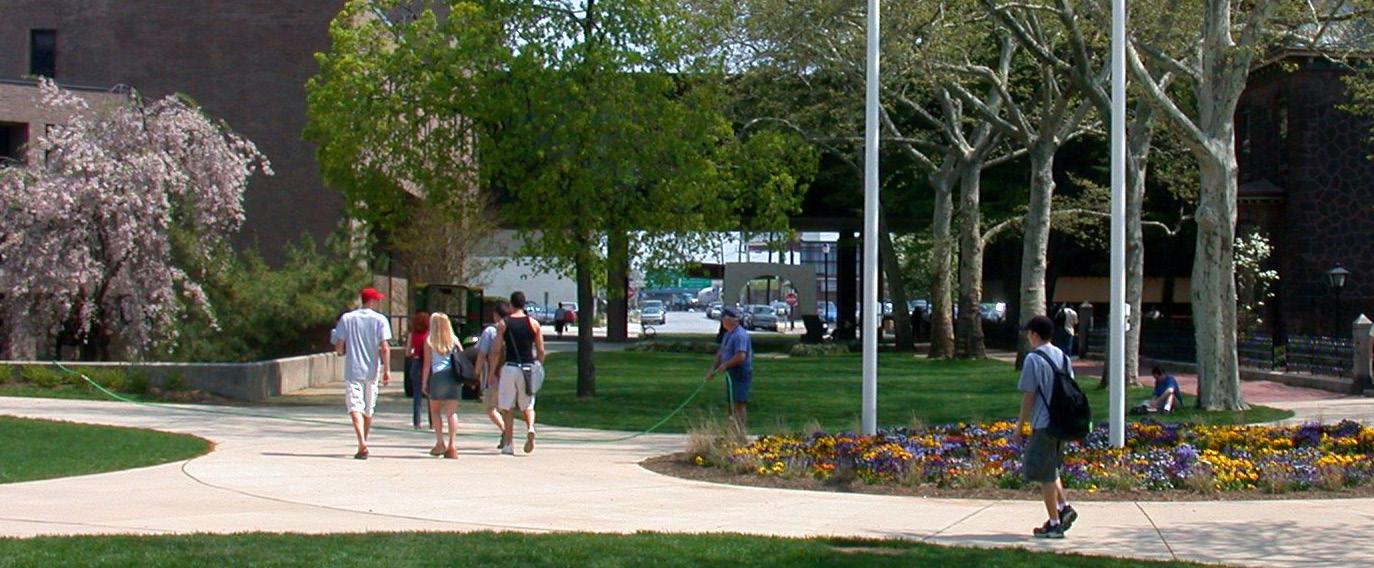

NEW NURSE RECRUITING EVENT
March 11 | 12:30 – 2:00p
PREPARE FOR THE FAIR RU FAIR


LINKEDIN LAB
Thursday, February 13 | 5:00 – 6:00p Virtual on Zoom
FINDING YOUR SUMMER/FALL INTERNSHIP
Wednesday, February 26 | 11 20a – 12:20p Virtual on Zoom
CAREERS IN SOCIAL SERVICES & WELLNESS
Thursday, February 20 | 12:45 – 1:45p Virtual on Zoom
CHAT GPT, AI & THE JOB SEARCH
Wednesday, March 5 | 11:20a – 12:20p Virtual on Zoom
INTERVIEW LIKE AN EXPERT
Monday March 10 | 11:20a – 12:20p Armitage 105 Tuesday Apr l 22 | 12:45 – 1:45p Virtual On Zoom
MAXIMIZING YOUR INTERNSHIP & JOB SEARCH WITH HANDSHAKE
Monday Apr l 7 | 5:00 – 6:00p Virtual on Zoom
CRAFTING AN EFFECTIVE RÉSUMÉ
Thursday, January 30 | 12:45 – 1:45p Virtual on Zoom
Thursday, March 27 | 12:45 – 1:45p Armitage 109




The Fall Job and Internship Fair is an annual highlight event where local employers bring job and internship information to campus for the students.
All students are encouraged to attend the Fair because there are careers and internships represented for all majors. This year’s Fair was held October 8, 2024, in the Campus Center MPR. The entire Career Center staff along with other SAS colleagues, assisted students with registration and matching students with opportunities.
Close to 400 students attended, and 66 regional employers were represented! There were a lot of important connections made, and some great relationships established between the students and potential employers. Many students came to the Fair interview-ready with resumes, portfolios, and professional etiquette and dress. Responses from employers included
“Great turnout. Students willing to engage and learn.”


IDENTIFYING TRANSFERRABLE SKILLS ON YOUR RÉSUMÉ
Tuesday February 18 | 12:45 – 1:45p Virtual on Zoom
RÉSUMÉ C CRITIQUE SERVICE Email your resume to: careercenter@camden.rutgers.edu




“Great event. Students were polite and showed an interest in the company and opportunities. They were prepared with a resume and list of their skills.”





















One senior business management major student came to the Fair with goals in mind: Ahmed Abdou is a Business Management Major and Human Resources Minor, and he wants to pursue a career in employee relations and compensation management. Good luck to our seniors; they are well on their way! Stay tuned for the Spring 2025 Job and Internship Fair!




Schedule an appointment via Handshake or call 856.225.6046
Lower Level—Campus Center careercenter.camden.rutgers.edu careercenter@camden.rutgers.edu
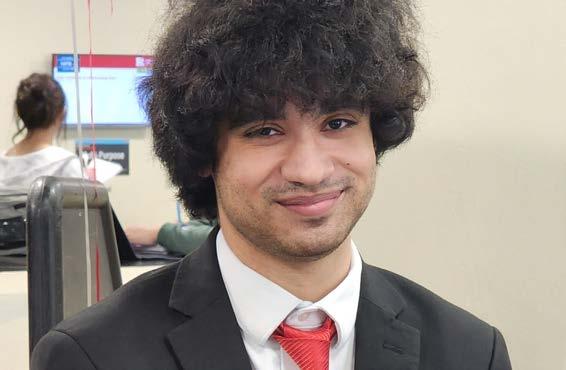





In each issue of the Student Success Insider, we will highlight members of the campus community whose efforts reflect the Division’s mission to promote student excellence and persistence. Stay tuned for nomination details for the next winners.

We are pleased to congratulate three outstanding campus community members with the Raptor Recognition Award.
Those recognized have demonstrated effort that contributes to student success, retention, persistence and/or timely graduation. Each year, one student, one faculty member, and one staff member can be recognized.
The 2024 winners are:
STUDENT Shai’on Brown
FACULTY Wojtek Wolfe
STAFF Samantha Kannegiser
Check out the thoughts about student success from the recent winners...



What does a successful student look like to you? What are the qualities and behaviors students can demonstrate that promote their college success? Successful students come from all backgrounds, environments, and experiences. One key to transforming their unique histories into future success is in cultivating their curiosity and determination. Students can navigate setbacks effectively by embracing their curiosity and pursuing their interests with resilience. Setbacks can be difficult to manage but provide essential feedback that guides them toward growth and success. This mindset contrasts sharply with a passive approach or reliance on a formulaic success manual. Success requires not just active engagement and persistence, but also adaptability, the ability to adjust and learn from every challenge. This takes time, but it is worth the effort.
In what ways have you been effective in utilizing students’ unique and personal experiences to help support their success? My approach to teaching and mentoring is always a work in progress that evolves as students and generations change. I adapt how I help students discover
their aspirations and chart a path to achieve their goals. A significant part of the work involves guiding students to recognize their inherent value and the unique strengths they bring to the table. The intent is to help them nurture those qualities to reach their goals effectively. I’ve found many valuable insights come from alums who return to share their experiences. Their feedback about what was helpful and what they needed more of helped me adjust my approach to better equip students for graduate school and the workforce.
How can faculty foster a great sense of belonging for students who may feel isolated, detached, or excluded from academic spaces?
Many students often experience feelings of isolation or detachment from both the academic environment and the challenges of college life as a whole. Helping them discover their purpose becomes the key to channeling their focus and discipline toward achieving their goals. While we can help them set goals, it is ultimately their personal drive and vision that will keep them on track and moving forward.
What opportunities for collaboration, education, and training may be useful for faculty who are looking for better ways to support marginalized and underrepresented students? Rutgers has created many new programs for students to take advantage of. Some students may initially feel they wouldn’t fit into existing programs, but with encouragement, they can discover the value these programs offer. It’s important to help them see that these programs can be a stepping stone to their success. Often, students simply aren’t aware of the programs or they don’t realize they would qualify for the aid or help that the programs provide.
What does student success look like from your perspective?
From my perspective as a librarian, student success is about how students engage with their learning, where students actively seek information, think critically, and apply knowledge in meaningful ways. A successful student takes ownership of their learning and should feel empowered to use library resources to explore topics of interest, set goals, and seek help when needed. They also act with integrity by using resources ethically. Additionally, I think successful students exhibit curiosity. Rather than only focusing on grades—they embrace challenges, ask questions, and develop a lifelong love for knowledge. Ultimately, student success is about growing into well-rounded individuals who thrive academically, socially, and personally.
What are some challenges you have witnessed historically excluded / underrepresented students struggle with at RU-C?


How do you see your role as a higher education professional in shaping and enhancing the college experience of your students, particularly those from marginalized groups?
“Success requires not just active engagement and persistence, but also adaptability, the ability to adjust and learn from every challenge. This takes time, but it is worth the effort.”
I notice our students are balancing many competing responsibilities: school, work, family, friends, etc. College is a time to explore new ideas, meet new people, and get involved in their areas of interest, but that can be complicated when also handling demanding work schedules, children, siblings, parents, and more. I’m glad to see many support services that take this into account. Our campus offers many resources on time management, avoiding burnout, and support for writing and researching that I think benefit students who have a lot going on in their lives.
As a student success librarian, I see my role as cRU-Cial in shaping a positive, inclusive college experience for all students, particularly those from marginalized groups. I aim to provide equitable access to resources and create a welcoming space where students feel valued and supported. By offering a diverse range of materials, including those that reflect a variety of cultures, histories, and perspectives, the library helps students from underrepresented backgrounds feel seen and heard. I also play a key role in information literacy instRU-Ction, teaching students how to navigate and critically assess sources, which is especially important for students who may not have had the same level of exposure to these skills in earlier education. Additionally, I offer personalized research assistance, helping students build confidence in their academic abilities and ensuring they have the tools they need to succeed. Beyond academics, I strive to foster a sense of belonging and community in the library, where students can access support and mentorship. From orientation to cocurricular workshops to stressbusters events at finals, librarians create opportunities for students to meet each other, learn something new, and get comfortable in the library.
What strengths or positive contributions do you see underrepresented students bring to the campus community?
Underrepresented students bring a wealth of strengths and positive contributions to our campus. Their diverse backgrounds and experiences
foster creativity, offering fresh perspectives that enrich academic discussions. These students can draw on their unique cultural, social, and personal experiences, helping to deepen understanding and promote empathy among peers. Underrepresented students help build a more inclusive and diverse campus culture. Through their traditions, languages, and viewpoints, they enrich the community and promote crosscultural dialogue, broadening the horizons of all students. Their presence contributes to a dynamic learning environment, one that prepares students for a more globalized society.
How can faculty, staff, and administrators assist students in recognizing their own skills and abilities? Mentorship and advising are essential in guiding students through their academic journey, helping them identify and develop their talents. Although our campus is small, we have a wealth of resources available to students. Faculty, staff, and administrators take time to speak with students, giving them personalized feedback, connecting them with important resources like the library, tutoring, the career center, etc., and offering them opportunities to explore their interests. For example, I facilitate the Library Student Advisory Board which gives students an opportunity to explore skills in leadership, marketing, communications, administration, event planning, research, and advocacy. These students have facilitated events, made tangible changes in the library, and some have presented at conferences and written articles on their experiences.

How do you measure your own success as a college student?
I measure my success by my personal growth, not just in academics but in how I balance my commitments. Success is when I do meet deadlines… contribute to meaningful discussions, and feel like I’m leaving a positive mark on campus! It’s also about overcoming challenges—whether its nailing a presentation project or staying organized during really hectic weeks.
Who or what been instrumental in helping you overcome some of your greatest challenges in college? What kind of help did you receive? My motivation truly comes from the future I’m building today. Knowing that all the hard work, despite the hardships and moments I wanted to give up, will eventually pay off keeps me going. The guidance I receive from the C.L.A.S.S. staff and being an EOF Scholar has been invaluable. These opportunities have allowed me to network, access resources, and find support when I need to vent about my worries. Working as a PAC has also provided me with a wellrounded community that helps me stay grounded and motivated.
How has your experience as Peer Academic Coach contributed to your own learning or the learning of others? Being a PAC has sharpened my communication and problem-solving skills! While time management is

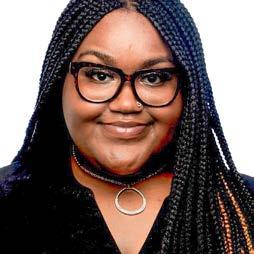
something I’m still working on, this role has helped me recognize its importance. Supporting other students in planning their schedules and breaking down challenges has inspired me to adopt some of the strategies I share with them. It’s just fulfilling to see students grow confident, and their progress motivates me to keep improving alongside them.
Can you share some information about your involvement in any academic, social, or leadership activities on campus? How have these experiences helped to shape you as a student?
I’m the PR representative for the Caribbean Student Association, the Community Outreach Coordinator for the Black Student Union, and a staff writer for The Gleaner. Each role has expanded my perspective, taught me teamwork, and strengthen my organizational skills! Whether I’m planning an event, advocating for my peers, or reporting on issues, I’ve learned how to make my voice and actions impactful.
What is your proudest accomplishment as a RU-C student?
In all honesty, my answer to this keeps changing because 2024 has been nothing short of amazing for me as a student. Making the Dean’s List last semester with no C’s was an absolute highlight for me, and I was so proud of that achievement. But then, earlier this week, I was awarded the Benjamin Gilman Scholarship,
funding for Pell Grant students to learn or study abroad. I was one of four students selected from this campus, which shocked me because I was so sure I wouldn’t win! On top of that, I was selected to participate in The Gleaner: Experiencing International Journalism trip to London and Paris this spring, which is a dream come true. Being chosen to be featured in the January 2025 edition of the Student Success Insider (SSI), the Student Academic Success Division’s newsletter, has also kept me cheesing these past few days. It’s been an incredible year, filled with accomplishments that make me proud and motivated to keep going.
What would you want staff and faculty to know about how to best support their students during their time in college?
I’d want them to understand the importance of flexibility and empathy. Many students juggle jobs, families, and other commitments alongside their academics. Being approachable and willing to listen can make a significant difference. Even small gestures, like providing resources or offering deadline extensions, can show students that there are people in their corner who genuinely want to see them succeed. Sometimes, that encouragement might be the exact push a student needs to keep going.


Check out the details from the Third Annual Raptor Rising Star Awards Ceremony that took place October 1st, 2024 in the Campus


